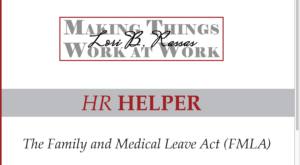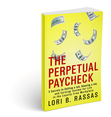Lori B. Rassas's Blog
May 8, 2018
What to do if you’re forced to toe the company line on a sexual harassment case?
May 2, 108
What to do if you’re forced to toe the company line on a sexual harassment case
by Meera Jagannathan @meerajag for Moneyish/Dow Jones (Full article can be found at https://moneyish.com/ish/what-to-do-i...)
Female NBC News staffers felt “forced” to sign a letter in support of embattled newsman Tom Brokaw, according to a report
Sexual Harassment
Workplace
Peacock Network women are reportedly under pressure.
Female NBC News staffers felt “forced” to sign a letter in support of embattled newsman Tom Brokaw, according to a Page Six report. The letter, which last week drew dozens of signatures and support from big-name colleagues like Andrea Mitchell, Rachel Maddow, Maria Shriver and Mika Brzezinski, came after two women accused the longtime “Nightly News” anchor of sexual misconduct in accounts to the Washington Post and Variety. (A third accuser aired her own allegations Tuesday in a first-person piece for The Villager.)
“We felt forced to sign the letter supporting Brokaw. We had no choice, particularly the lower level staffers,” an anonymous NBC News staffer told Page Six. “The letter was being handed around the office and the unspoken threat was that if your name was not on it, there would be some repercussion down the road. Execs are watching to see who signed and who didn’t. This was all about coming out in force to protect NBC’s golden boy; the network’s reputation is tied to Brokaw . . . If more women come forward, that’s a big problem.”
NBC newcomer Megyn Kelly, for her part, expressed love for Brokaw on her “Today” show hour Monday — but pointed out that “letters like that can be dicey,” as “you don’t know what you don’t know.”
Brokaw has denied the allegations, calling them “sensational claims.” And while reps for NBC News did not return a Moneyish request for comment, a network spokesperson told Page Six the letter was “a purely grassroots effort, led by women outside of the company who are motivated by their own support for Tom Brokaw,” and that management played no role. Goldman Sachs executive Liz Bowyer, who worked as a producer on Brokaw’s NBC documentary unit, reportedly led the effort. (Bowyer, meanwhile, told the L.A. Times on Tuesday there was no attempt to coerce women who didn’t respond to a request to sign.)
It’s difficult to make a legal case for “pressure” unless there’s tangible evidence of retaliation, employment attorney Mary Kuntz of the Washington, D.C. firm Kalijarvi, Chuzi, Newman & Fitch told Moneyish. “I would need one of these people to call me and say, ‘Look, I got demoted to the mailroom because I was the only woman in the office who didn’t sign the Brokaw letter,’” she said. “Right now, it’s just a kind of feeling that people can see who signed and who didn’t … And that certainly is conceivable, but it can also just be a feeling that a person has.”
But while Kuntz defended the tactic of fighting a sexual harassment allegation by having supportive female colleagues testify — “It’s not bad evidence; it’s just not conclusive evidence” — she took issue with the format itself, as many of the people signing the letter may not even know Brokaw well. “I think those are the ones that are saying, ‘Don’t pressure me to sign this.’ … And in some ways they’re right, but it’s not that they’re being pressured to sign — they need to say, ‘I don’t actually know him,’” she said. “Don’t sign a petition; this isn’t something you petition for. What you need to do is go on the record with your experience.”
Employment attorney Paula Brantner, a senior adviser to the nonprofit Workplace Fairness, argued that the power dynamics of a work environment mean that such a letter “just can’t be truly voluntary.” “You’re always part of a power structure and a supervision structure, so you always have to worry about your loyalties and what you need to do to protect your job,” she told Moneyish.
“An individual who is working in this environment, where there is a significant fear of retaliation for the reporting of a complaint, might very well feel pressure to support someone who was accused of harassment when asked to do so by their manager or by someone who has direct or even indirect control over their working conditions,” added employment attorney and HR consultant Lori Rassas, author of “The Perpetual Paycheck,” in an email.
“It is not a significant leap to assume that if someone could be subject to adverse consequences for reporting harassing behavior, then they might also be subject to adverse consequences for declining to show support for the alleged harasser,” Rassas said.
If you’re reluctant to signal your support for an alleged workplace harasser — whether it’s because you don’t know them, don’t want to be involved or have an allegation of your own — here’s expert advice on what to do:
Say no, but be smart about it. Even if you’re a lower-level staffer, Kuntz said, “at some point you have to say no” — you just have to find a way to finesse it. “You don’t have to say, ‘No, I’m not going to do that.’ … Say, ‘Gee, I guess I see him in the hallways occasionally, but I don’t really think I can sign this because I don’t really know him,’” she said. “‘But let me take it over to her over there and see if she wants to sign it.’ And just get rid of it.”
Stall. “There’s always the kind of ‘action by inaction’ strategy,” Brantner said. You might say you’d like to wait and see if you hear from human resources, she said, or say you want to check with your boss to see if they want you to be involved.
Write your own letter. “Stay true to your knowledge of the person or of the issue and … don’t sign on to a letter unless you have as much knowledge of whatever the issue is as the person who originally wrote the letter,” Kuntz said. “If you have no knowledge, then you don’t sign it — just like you don’t testify to an accident that you didn’t witness.” It’s hard for others to object to your offer to write your own letter, she added; plus, you can simply say you’re writing one and then not do it. And if you happen to have had negative experiences with that person, you can write that damning account.
Seek strength in numbers. “Employees kind of taking a stand may be helpful to nipping this in the bud,” Brantner said. “Talk to other coworkers and get a sense of how other people feel about it, and (see) if there’s a way for everyone to stand firm on it.” If your workplace is unionized, she added, consult with your union rep about what kind of participation you can be forced to have.
The post What to do if you’re forced to toe the company line on a sexual harassment case? appeared first on Lori B. Rassas, LLC.
February 28, 2018
Gray layoff: How to bounce back
Thanks to Eileen Ambrose and the Chicago Times for including me in article about strategies older candidates can use to get back in the game after a layoff. You can (and will) bounce back!
Gray layoff: How to bounce back
By Eileen Ambrose
Kiplinger’s Personal Finance / Chicago Times
February 27, 2018
Few events can derail retirement plans faster than losing a job. That’s particularly true for older workers who might be laid off in their peak earning years, when they had been counting on catching up on retirement savings.
Older workers have one of the lowest unemployment rates of any sector of the workforce: 3.3 percent or less, as of the end of last year. But once they lose a job, it takes them longer than younger job seekers to find a new one.
On average, 25- to 44-year-olds land a new job in just over five months, but it takes two to five months longer for older workers, depending on their age, reports the Bureau of Labor Statistics.
How can you get back on track?
Reconnect with contacts from college or previous jobs to let them know you need work:
“Everybody finds jobs through networking,” says Lori B. Rassas, an employment attorney and author of “Over the Hill But Not the Cliff.”
Send emails to former bosses and co-workers and take people you admire out for coffee and ask them for advice. Even if you don’t find a new job through your connections, you likely will pick up a few good pieces of advice and receive a bolstering pep talk or two.
Try to dispel the stereotypes concerning older workers: Ageism is a reality for older job seekers, Rassas says, but there’s no need to scrub your resume of all hints of your age.
“No one cares that you’re 60,” Rassas says. “It’s not the age. It’s what it represents.”
Employers often assume older workers have low energy and are inflexible, uncomfortable with technology and merely biding their time until retirement.
Stay current: To overcome these ageist views, show that you are still interested in learning by attending conferences and learning new skills.
Sites such as Udemy, Lynda.com, Coursera and Khan Academy and open courses from sites such as MIT, Yale and Stanford teach robotics, programming, marketing strategy, philosophy and more, Forbes.com notes.
Be involved online: Check social media to see what influencers are posting and post your own content about areas of expertise. Build connections there.
Update your LinkedIn profile and ask people to write recommendations for you or endorse you for skills. If you don’t have a LinkedIn profile, employers may assume you lack the technology skills to keep up, Rassas says.
Apply to smaller companies: They often get fewer résumés than larger employers do, Rassas says. You may have to accept less pay, but don’t offer to take a large pay cut right off the bat because you may sound desperate, she says.
Once you find a job, develop a side hustle in a related field that brings in money and broadens your network. If you’re laid off again, the side gig can at least provide income while you search for other work, Rassas says.
Eileen Ambrose is a senior editor at Kiplinger’s Personal Finance magazine. Send your questions and comments to moneypower@kiplinger.com.
Click here for the full article.
And, if you are interested in learning more about job-search strategies I have you covered! Head over to Amazon to check out my book that tackles ageism in the workplace, Over the Hill but Not the Cliff or The Perpetual Paycheck (Volumes 1 and 2).
The post Gray layoff: How to bounce back appeared first on Lori B. Rassas, LLC.
February 21, 2018
Should you should stay or should you go? Free Article (..for a limited time)
 Are you struggling with deciding whether you should remain in your current job or whether you should make a change? If your current employer does not value what you bring to the table, perhaps it is time to find another table. On the other hand, depending on your circumstances, it may be in your best interest to remain in your current job and bloom where you are planted.
Are you struggling with deciding whether you should remain in your current job or whether you should make a change? If your current employer does not value what you bring to the table, perhaps it is time to find another table. On the other hand, depending on your circumstances, it may be in your best interest to remain in your current job and bloom where you are planted.
I have a lot to say about this common dilemma, and for the next two days you can download my article about this very topic for FREE on Amazon. You can access the article here: http://amzn.to/2CAGn8U
And, if after you are done reading this article, you are interested in learning some new strategies you can use to navigate today’s workplace, be sure to also check out the limited time offer I am running on my new book, The Perpetual Paycheck: 5 (more) Secrets to Finding a Job, Keeping a Job, and Earning an Income for Life in the Loyalty-Free Workplace, which you can find here: http://amzn.to/2Fl5uhV
Best of luck in your job search, I know you can do it!
The post Should you should stay or should you go? Free Article (..for a limited time) appeared first on Lori B. Rassas, LLC.
February 2, 2018
Retirement Derailers
Thanks to Kiplinger’s for including me in such a great article about retirement derailers.
If you lose your job and feel like your age may be preventing you from finding a new one, as I explain in my book, Over the Hill But Not the Cliff, there are a number of strategies you can use to push past ageism and get that coveted offer.
3 Scenarios That Could Derail Your Retirement
By Eileen Ambrose, Senior Editor and Kimberly Lankford, Contributing Editor
| February 1, 2018
From Kiplinger’s Personal Finance
 Even the best-laid plans for retirement can suddenly go awry if a major life event strikes. For example, a sudden job loss, a marital break-up or becoming a caregiver for an ailing parent or spouse can wreak havoc on finances – potentially for years. But even if you’re hit with one of these life events, you can get your retirement back on track. Here are three major retirement derailers, as well as resources and strategies to overcome them.
Even the best-laid plans for retirement can suddenly go awry if a major life event strikes. For example, a sudden job loss, a marital break-up or becoming a caregiver for an ailing parent or spouse can wreak havoc on finances – potentially for years. But even if you’re hit with one of these life events, you can get your retirement back on track. Here are three major retirement derailers, as well as resources and strategies to overcome them.3 Scenarios That Could Derail Your Retirement
You Lose Your Job
 Older workers have one of the lowest unemployment rates of any sector of the workforce—3.3% or less, as of December. But once they lose a job, it takes them longer than younger job seekers to find a new one. On average, 25- to 44-year-olds land a new job in just over five months, but it takes two to five months longer for older workers, depending on their age, reports the Bureau of Labor Statistics.
Older workers have one of the lowest unemployment rates of any sector of the workforce—3.3% or less, as of December. But once they lose a job, it takes them longer than younger job seekers to find a new one. On average, 25- to 44-year-olds land a new job in just over five months, but it takes two to five months longer for older workers, depending on their age, reports the Bureau of Labor Statistics.
How to get back on track. Reconnect with old contacts from college or previous jobs to let them know you’re newly unemployed. “Everybody finds jobs through networking,” says Lori B. Rassas, an employment attorney and author of Over the Hill But Not the Cliff.
Ageism is a reality for older job seekers, Rassas says. But rather than hide your age by eliminating all dates on your résumé, try to work around the stereotypes of older workers. “No one cares that you’re 60,” Rassas says. “It’s not the age. It’s what it represents.” Employers often assume older workers have low energy and are inflexible, uncomfortable with technology and just biding their time until retirement.
To overcome these views, show that you are still learning and on the cutting edge of your field by attending conferences, serving on panels at seminars or writing articles, she says. Post your profile on the business networking site LinkedIn. If you don’t have a LinkedIn profile, employers may assume you lack the technology skills to keep up, Rassas says.
Apply to smaller companies that get fewer résumés than larger employers do, Rassas says. You may have to accept less pay, but don’t offer to take a large pay cut right off the bat—you may sound desperate and turn off an employer, she says.
Once you find a job, develop a side hustle in a related field that brings in money and broadens your network. If you’re laid off again, the side gig may become your main employment—or at least provide income while you search for other work, Rassas says.
You Get Divorced

The divorce rate for those age 50 and older has doubled since the 1990s. In 2015, 10 out of every 1,000 married persons divorced, and the number of so-called “gray divorces” was even higher among those in remarriages, according to the Pew Research Center. Divorce can upend retirements. “You are now maintaining two households with the same amount of assets you spent a lifetime building. It can be devastating,” says Haleh Moddasser, author of Gray Divorce, Silver Linings: A Woman’s Guide to Divorce After 50.
How to get back on track. For couples splitting up, Moddasser suggests “collaborative divorce,” in which spouses and their lawyers meet with the goal of creating a win-win situation for both partners.
Or, if you’re already divorced, the new tax law may make it worthwhile for you and an ex to renegotiate the settlement. Starting with settlements reached in 2019, alimony payments will no longer be tax-deductible, and alimony income won’t be taxed. It’s possible, Moddasser says, for an ex to pay less in alimony while the recipient still comes out ahead because payments won’t be reduced by taxes.
You may be eligible to receive Social Security benefits based on an ex’s work record if the amount will be larger than you’d get on your earnings history. You must be single, you and your ex have to be at least 62, and the marriage must have lasted 10 or more years, says Mary Beth Franklin, a CFP and contributing editor at InvestmentNews. This chance for a bigger benefit is one reason Franklin advises married couples near the 10-year mark to wait to divorce. “If your marriage is on shaky ground in years eight or nine, stretch out the paperwork,” she says. “Because if you are married, literally, nine years, 11 months and 29 days, and you get divorced, you’re out of luck.”
You Become a Caregiver

Caregivers who look after a parent or relative often jeopardize their financial security, over the short and long term. If they reduce their work hours, they may no longer be able to contribute to an employer retirement plan, meaning they don’t get the company match. If they’re forced to quit altogether, they may have a tough time finding a job when they’re ready to return to work.
Merrill Lynch and Age Wave, a consulting firm that studies aging issues, surveyed more than 2,200 unpaid caregivers and found that 24% said they had trouble paying their bills, 21% dipped into savings and 18% couldn’t contribute to other expenses or savings—which can have a long-term impact on their own plans. “Caregiving is a hidden threat to retirement security,” says Catherine Collinson, of the Transamerica Center for Retirement Studies. “We talk about market fluctuations, but caregiving is just as risky a proposition.”
Marie Johnson Bosscawen, 55, is trying to get her retirement plans back on track after moving her ailing parents from Ohio in 2015 to be near her in North Carolina. “It became so much to manage. I ended up quitting my job,” says Bosscawen. She stopped saving for retirement, and her husband reduced his 401(k) contributions to increase his take-home pay. Since then, Bosscawen’s mother has died, and her father, who has dementia, has moved from her home to a senior facility. Bosscawen has a new job as a safety specialist that pays more than the her old job, and she socks away money in her 401(k) and IRA. Her husband has boosted his contributions, too. They sold their 4,000-square-foot house to buy one that’s about half the size with a smaller mortgage that they hope to pay off in 10 years, when either one or both of them can retire, she says.
How to get back on track. Resources available in your area may help you provide care while you keep your job. Your local Area Agency on Aging has information about home-care agencies, senior centers, transportation and other services (see the Eldercare Locator at Eldercare.gov.
Some employers offer resources for caregivers. Fabiola Brumley, 54, a Bank of America executive in Florida, had to find care for her mother, who suffered a stroke. Brumley joined a caregivers group at work and discovered that the bank offered a free meeting with a geriatric care manager each year. She also signed up for backup care, another employee benefit, which provides emergency care for $6 per hour if Brumley or her mother’s caregiver isn’t available.
The post Retirement Derailers appeared first on Lori B. Rassas, LLC.
January 29, 2018
How are your sandwiches?

There is a classic Peanuts comic strip that shows Charlie Brown opening his lunch on a few consecutive days and dreading what he finds. Finally, Lucy asks Charlie Brown who makes his sandwiches. He says that he does!
Many of us continue to go to work day after day, fully aware that we can do better but not doing whatever it takes to change our destinies. How are your sandwiches? If you have read this far, the answer is probably not so great. Isn’t it time to make a new one?
I speak and write extensively about the modern workplace, and I have and continue to represent both employers and employees. And, when I provide guidance it is not about picking sides, or convincing you that employers are bad and employees are good. Instead, it is about providing you with a guide to the modern workplace—the loyalty-free workplace—so that you can make informed decisions and achieve unprecedented success.
One theme that runs through all of my books is that it is critical for everyone–both employers and employees–to re-evaluate how we look at employment. The reality is that most of us will not work for the same employer for our entire working life. Because of this, I focus on the significance of what I refer to as side hustles, which are projects or income streams that are designed to supplement our primary job and source of income.
Why is this so critical? First, your side hustle will serve as a safety net in case your initial stream is disrupted. Remember, even if your primary income stream is stable, in the loyalty-free workplace there are no guarantees. There are factors beyond your control, such as your boss or economic conditions, that can work against you. No one is immune from circumstances that can result in the sudden loss of your job and possible financial disruption. The trick is to safeguard yourself with a Plan B (and maybe even a Plan C) so that you can withstand whatever disruption occurs while still propelling your income to new heights. Establishing this foundation will go a long way toward eliminating the financial chaos that may otherwise materialize if you rely on a single income stream.
Further, even if you do not lose your job, a second income can help you recover from a financial shortfall if we do not receive a financial payment we had expected from our primary employer. In a perfect world, each year we will earn more money than we did the year before, plus we will likely experience large jumps in salary as we move from one company to another. But we do not live in a perfect world, and as such, there may be times when our salaries will not increase as much as anticipated.
Suppose your company decides to forgo holiday bonuses because its stock value has dropped. Or perhaps the company lost a lucrative account, or is about to be acquired by another company, or is facing a lawsuit that requires them to spend millions of dollars on a legal defense, a legal settlement, or even to pay a damage award. Regardless of the reason, you were likely counting on that bonus, and now you are not going to get it. Consequently, the amount of money you expected to make that year has been significantly reduced. The problem, of course, is that you still have bills to pay. In some cases, when an employer is faced with a crisis, your wages may be frozen. This may address your employer’s shortfall, but your mortgage or rent payment will likely be the same and in most cases will have continued to rise. Having a secondary income will not only lessen the impact of an unexpected shortfall, but it assures that you receive a least a small perpetual paycheck to help you ride out the storm.
Consider a stock market analogy: companies often have some investments that are not high performers. Because there are ebbs and flows to any business, the gains of the better performers tend to offset the losses of the poorer ones. So if you own one stock that is doing particularly well and another that continues to decline, your investments may still show an overall gain despite this unsettling period. Knowing that a reduced tax liability for the high performer will counteract the loss from the low performer, you might elect to sell a portion of each investment.
This is precisely how you should handle your streams of income. Your primary stream will cover your regular expenses, while your secondary stream will carry you through those times when your primary earnings do not perform, so to speak, as expected.
This is just one of the many significant benefits of a side hustle, and a number of them may truly surprise you. And, there are a lot of different ways to find a side hustle, and there are many reasons why some types of side hustles are going to be more beneficial than others. Are you interested in learning more about side hustles and other strategies to navigate today’s workplace? I have you covered! Head over to Amazon to check out my new book, The Perpetual Paycheck: 5 (more) Secrets to Finding a Job, Keeping a Job, and Earning an Income for Life in the Loyalty-Free Workplace to learn more.
Thanks for reading and best of luck in your job search. I know you can do it!
The post How are your sandwiches? appeared first on Lori B. Rassas, LLC.
November 14, 2017
159,544 likes and 11,575 comments? Seriously?

Image credit: feverpitched © 123RF.com
Last week Oleg Vishnepolsky, the Global CTO at DailyMail Online & Metro.Co.Uk, posted a LinkedIn comment saying that he once hired (gasp!) a person over 50 years of age.
Oleg went on to write about the resistance he had to overcome when making this decision, being on the receiving ends of comments such as 1) the candidate will never work hard enough; 2) the candidate will not fit in our culture; 3) the candidate is overqualified etc. Turns out, Oleg writes, the candidate ended up being one of the best hires he ever made.
The content of this post did not surprise me but what did was that, within just a short period of time, 159,544 people liked the post and 11,575 people took the time to post a comment. There were some comments that recognized the skills of 50+ workers—perhaps these individuals do not have any hiring authority. However, there were also thousands of comments from people who are 50+ and have found themselves facing the exact obstacles that Oleg identified. (See the full post here.)
Attention hiring managers: it is up to you to solve this problem. If you are in 50s or 60s, pay attention! If you are in your 30s or 40s, you should also take notice because within the blink of an eye, this will be you. And to my Millennial friends and colleagues who consistently tell me how much they resent it when prospective employers make comments about their age, or stereotype their generation, this, too, is your problem to solve.
Just to be clear: I am not advising anyone to hire someone just because they are 50+, just as I would never advise anyone to automatically eliminate a candidate who is at the beginning on their career. What I am saying is that when hiring, we all need to remove age from the conversation—just as most of us know to eliminate race, color, sex, religion, national origin and an entire list of other protected classes. Imagine what would happen if we all focused on hiring the most qualified candidate, regardless of the four-digit number on their driver’s license.
And, yes, as I know a little something about ageism in the workplace & wrote a book about it, Over the Hill Not the Cliff. In it, I provide older job seekers with strategies to combat many of the stereotypes 50+ job seekers who commented on Oleg’s post continue to face. After reading his post (and more significantly, the responses), I decided to reduce the price of the Amazon eBook to 2.99 cents through the end of Thanksgiving weekend, November 26th. (If you are interested, you can get it here.)
Seriously….we can all can (and should) do better. With all that is happening in the world, this is a problem we can easily solve. Are you in?
The post 159,544 likes and 11,575 comments? Seriously? appeared first on Lori B. Rassas, LLC.
September 15, 2017
Love Your Life, Do Your Job

Somyot Techapuwapat © 123RF.com
Over the past few months I have spoken to a number of recent graduates about their future career plans and many of them tell me they cannot wait to forge ahead, discover their passions and follow their dreams.
This is an admirable goal, for sure, but unfortunately, what I have found is that following that advice can be a hindrance to your ability to find a job in the loyalty-free workplace.
Now before you start to tell me I am wrong, let me make an important distinction: A job is an incredibly powerful tool that can help us realize our dreams. Our jobs allow us to make money, which we can use to follow our passions, pursue our dreams, and celebrate the things we love. In other words, our jobs and our dreams are not one and the same—and yet, far too often, we ignore this reality and try to combine the two.
In the loyalty-free workplace, where companies are fixated on finding candidates with the prefect “Cinderella fit,” you need to separate your passion from your employment to land the job. There are many practical reasons why. For one, finding work in today’s economy is hard enough as it is. Why make it harder on yourself by creating unnecessary obstacles? Yet, if you limit your job search to what you’re passionate about, that’s exactly what you’re doing.
Besides, let’s look at the bigger question: Do you know many people who really love their jobs? OK, maybe you have a few friends who love the industry in which they work (or, at least, love talking about the fact they work in a particular industry). And if you’re like most people, you probably enjoy some of what you do at work, and you like enough of your colleagues to consider them friends or even extended members of your family.
But, when you get down to it, if we really loved everything about our jobs why do we call it work? After all, if you love your job, there is nothing you would rather do, and no place you would rather be. But I have had mornings where the last thing I wanted to do was get up and go to work (and I am sure you have, too). And for all the things we like about our job, there are aspects of it that we would rather not do, and colleagues we could do without seeing.
This is not to suggest that, deep down, we all really hate our jobs. Our jobs are important because they are a means to an end. But they are not, in fact, the end. While some people may love what they do for a living, the vast majority of us will never work in jobs for which we have an intense passion, and from which we achieve great joy and satisfaction. That being the case, it makes very little sense to dedicate so much time, energy, and resources to reaching a goal that likely will never materialize. Instead, we are better off looking for positions that match our skills, so that we can obtain the means to enjoy the things that we are passionate about.
Look at it this way. The problem with limiting a job search to jobs that we feel passionate about is that, oftentimes, we do not really know what we might enjoy until we immerse ourselves in it. Not only that, but even if we know what we’re passionate about now, how do we know that our passions won’t change over time?
You may have a passion for watching movies, but are you willing to spend sixty hours a week working with challenging personalities, while developing a skin thick enough to deflect the comments of studio executives who think your clients should accept significant pay cuts because they earn too much money?
To be honest, working in the business might even ruin your passion for films. There are many retired employees who were once passionate about their jobs—only to never drive a car manufactured by the company from which they just retired, buy a pharmaceutical from the company where they spent the last thirty years working, nor eat at the restaurant that they spent the prior twenty years managing.
Now let’s say you have listened to all the arguments and still decide that you will target only those positions that line up with your “dream job.” Even so, there are practical reasons why you should discuss your passion only as it relates to the skills required for the position for which you are interviewing. Why? First, and foremost, despite all your enthusiasm, you passion may prevent you from landing the offer. In some cases a potential employer may view your passion as something that might interfere with your success. After all, how confident will a prospective employer be that you will aggressively negotiate the terms of an agreement with the representatives of a famous sports player if you previously informed him the player was one of your childhood idols? Instead, if you minimized your passion and focused instead on his skills and knowledge of sports business in general, you would have been more likely to land this “dream job.”
Finally, no matter how much you love sports, toys, music, or whatever drives your passion, you cannot lose sight of the fact that, like everyone else in the loyalty-free workplace, you work for money. If you tell a hiring manager how excited you are to work in their field, he can use your passion against you by offering you a starting salary that is below what the employer originally intended to offer. Many employers bank on the fact that there are candidates who will work for less money because of their passion for the job. This is particularly true when it comes to jobs in television and other so-called “dream professions” in the entertainment industry. Employers know that, because many candidates who work in these industries are doing something they love, they are also more willing to work longer hours and take on additional responsibilities without additional compensation.
If this cultural shift seems daunting to you, it really shouldn’t. Keep in mind this is not an article about abandoning your passion. Far from it. Our passions and dreams give us the pleasure and flavor that continue to enrich our lives. I want you to aggressively pursue your passions, and finding a job that will provide you with the financial means to do so is the best way to accomplish this result.
I return to my original distinction: Our jobs are the engines that can drive us to our dreams. The hiring manager—and eventually the person who will become your boss—have the ultimate control over your job. When you equate your job with your dreams and your passions, you are handing someone else the keys to your car. Why would you want to do that?
In the loyalty-free workplace, we have to find out how much companies are willing to pay us to provide the services they want. Each day we cash our paychecks, and then we can fund whatever it is we love. This is something we can truly be passionate about.
Remember you only need one offer to turn things around. Best of luck in your search, I know you can do it!

pogonici © 123RF.com
Interested in learning more about how to navigate today’s workplace? I have you covered! Head over to Amazon to look inside The Perpetual Paycheck: 5 Secrets to Finding a Job, Keeping a Job, and Earning an Income for Life in the Loyalty-Free Workplace, or check out my latest book Over the Hill But Not the Cliff: 5 Strategies for 50+ Job Seekers to Push Past Ageism & Find a Job in the Loyalty-Free Workplace.
The post Love Your Life, Do Your Job appeared first on Lori B. Rassas, LLC.
September 8, 2017
Free Guide to the FMLA
I wrote a short guide to highlight the rights of both employers and employees under the FMLA and, for a limited time, I am making it availability for free. So if you are handling an FMLA matter or just want a quick reminder of what it provides, click here to access it through Amazon. http://amzn.to/2eL4BUs
The post Free Guide to the FMLA appeared first on Lori B. Rassas, LLC.
July 6, 2017
Yes, Cover Letters Are Truly Necessary!

ByKRISTINE FELLIZAR
18 hours ago
For the third year in a row, Bustle’s Upstart Awards are honoring young women who are doing incredible things in the realms of business, STEM, fashion and beauty, the arts, philanthropy, and beyond. Want to be an Upstarts honoree one day? Read on for career tips, insights, and inspiration to help get you there.
I can’t be the only one who feels like cover letters are the worst. Resumes are no big deal. You can pretty much keep the format, change a few keywords to fit the specific position you’re applying for, and you’re good to go. Cover letters, on the other hand, take a little more time, energy, and effort to put together the perfect words that will make the right impression to all the right people. But are cover letters really necessary?
If you’re someone who sees cover letters as optional rather than a necessity, you might want to re-think that. Because as Vicki Salemi, career expert at job site Monster tells Bustle, “Yes, cover letters are extremely important for job seekers today. Although, startups and smaller companies may not put as much weight on them, at least for mid-sized to larger companies, cover letters offer the candidate the opportunity to introduce themselves outside of their resume.”
You should think of your cover letter as a verbal elevator pitch, Salemi says. Keep it short, sweet, and make sure to include two to three outstanding reasons why you’re a spot-on fit. “You can also highlight any unique accolades that make you stand apart from the rest of the candidate pool,” Salemi says. For instance, if you were on a sales team and earned the most revenue for your company last year and won an award for it, that sort of thing can be included in your cover letter.
If you’re still not completely convinced that writing a cover letter isn’t a waste of your time, here are five reasons why cover letters are still important:

It’s no secret that the job market is tough and there are tons more applicants searching than there are jobs available. So doing all that you can to stand out from the crowd can only work in your favor. “I know from experience that many job seekers are under the impression that once a company starts the recruitment process, they methodically review each and every application, with the goal of whittling down the applicant pool to a manageable number of candidates,” Lori Rassas, hiring manager, career coach, and author of The Perpetual Paycheck: 5 Secrets to Getting a Job, Keeping a Job, and Earning Income for Life in the Loyalty-Free Workplace, tells Bustle. “Unfortunately, this review rarely happens because of the sheer number of candidates that apply for a vacant position. This speaks to directly a complaint that I often hear from clients, ‘I sent the company my application, but I never received a response.’ In response, I usually tell them not to take it personally because chances are, their applications were never even reviewed.”
While the reality is harsh, Rassass says when hiring managers have to deal with an overwhelming amount of applications, they often start by looking for “objective” ways to eliminate applicants from consideration. So if a cover letter is requested and one isn’t submitted, it’s not surprising that it would be eliminated first. Same goes for cover letters that are addressed to the wrong person or have glaringly distracting errors. “Employers know that candidates put forth their best effort in the interview process, and if a candidate does not have the time, interest, or inclination to explain why they are the ideal fit for the position, the employer will likely conclude they are not a fit at all,” she says.

Want the job? Of course you do. A cover letter is the perfect opportunity to tell the employer that you’re interested. “You want every prospective employer to know that you are truly interested in the vacant position and that you want to move forward in the process,” Rassass says. “You do not want to suggest to an employer that giving your application serious consideration will be a waste of time. I once worked with a recruiter who compared finding a job to looking for romance. Prospective employers, in many respects, are no different than potential suitors. Even though they know that you will always be targeting different employers, once they meet with you they’d like to be sure that you are completely committed to the vacant position, should they offer it to you.”

“Personally, I prefer a cover letter,” Bradley Shaw, hiring manager and SEO consultant, tells Bustle. “Resumes tend to be very dry, but a cover letter allows me to learn a bit more about the individual. The perfect cover letter is short, concise, one-page max. It should be personalized, not generic. Also, include your qualifications and end with a call to action.”

“Cover letters are only useful to me if they provide something that can’t be seen already in the CV,” Joanna Douglas, hiring manager and owner of Clean Affinitytells Bustle. “If it just regurgitates what is provided elsewhere, and uses over-the-top sales or promotion style speech, that’s a sure-fire way to get me to mark it lower than an application that doesn’t even have a cover letter. Overly wordy cover letters that provide me with no new information tell me that I will not want to read any reports or documents you generate as part of the job.”

“If your resume isn’t up to the experience expectations a role requires, a cover letter can go a long way for you!” Alina Basina, Global Head of Talent and Human Resources at Jobbatical, tells Bustle. “I once had a candidate apply for a developer role that he wasn’t really qualified for. But lucky for him, he wrote me a genuinely funny and well-researched cover letter. He seemed to know so muchabout our team, including how our copywriter writes and where many people from the company were originally from; he put so much effort into his cover letter that I had to talk to him! His excellent cover letter set him apart and in the end, we decided to hire him regardless of his lack of experience, because we knew he would go above and beyond to learn whenever and wherever necessary.”

Cover letters may not be required, but can work in your favor if done correctly. According to Basina, here are seven things you should keep in mind when you’re trying to write the perfect cover letter:
Spelling, grammar, and word usage are paramount in importance. So make sure your cover letter is perfect in that respect.
Be very careful of how you copy-paste. Even one slip up — the wrong company name anywhere on the letter — will get you instantly rejected.
Make yourself shine. Really try to sell yourself without sounding stuck-up. It’s a thin line between confidence and boastfulness, but you’ve got to walk it.
Make the first sentence catchy and attention-getting right off the bat.Remember how many of those they have to read in a day.
If you must do something “stunt-like” with your cover letter, try to put yourself in the employers’ shoes and figure out if it will actually resonate with them. Stunts can be great, but they can also be very annoying.
A cover letter is one of the only chances for recruiters to get to know you personally before an interview, so tell them something fun, funny, cool, inspiring, and/or thought-provoking.
But, please don’t write a novella about your life and why you’re right for the role. A paragraph or so will do just fine.
Nowadays, when many applications get screened by resume robots before landing across an actual pair of human eyes, it sometimes may feel like cover letters just aren’t worth all that energy you spend making them. Some job postings don’t even require you to submit a cover letter at all. But finding a job is tough, and there’s a lot of competition out there. If you want to boost your chances at landing an in-person interview, a well-crafted cover letter might get you there sooner.
The post Yes, Cover Letters Are Truly Necessary! appeared first on Lori B. Rassas, LLC.
May 31, 2017
Peek-A- Boo: Time to Abandon the Traditional Job Boards and Tackle the Hidden Job Market

Peek-A-Boo
Looking for a new approach to your job search? It might be time to tackle the hidden job market, which is a wealth of opportunities that are not yet advertised, as well as jobs that applicants proactively create where none currently exist. This source of opportunities has the potential to virtually eliminate some of the obstacles you might ordinarily face and have to expend precious resources to overcome.
In the hidden market, there are no gatekeepers to bypass because you will have eliminated the gates. The way you break down these barriers to entry is by placing your resume directly into the hands of the decision makers that you have determined will be most likely to make you a job offer.
One significant benefit of the hidden job market is that not only will applicants get to the hiring manager well in advance of the competition, in many situations there will be no competition at all: You are in control of the process. In most cases, you will be approaching the hiring manager before he has a vacancy to fill or realizes how he can benefit from the creation of a new role that just happens to be a perfect fit for your qualifications. And because (ideally!) you will only be targeting the opportunities for which you are the perfect fit, something I refer to as the Cinderella fit, this will greatly increase your chances of receiving an offer.
Knowing about the hidden job market and how to tap into it is a good thing—because you are essentially making a pitch for a position for which only you qualify. Despite these significant advantages, you would be surprised at how many job seekers resist the idea. Some say that it is hard enough finding a job among the vacancies that do exist—they do not have time to go on a scavenger hunt for opportunities that may never materialize. Others believe that if employers have hidden certain jobs from the public, they hid them for a reason and may not want outsiders to find them. Regardless of whether these are wise or accurate characterizations of the process, they are beside the point.
Remember, the modern workplace is loyalty-free and hiring managers work in the same loyalty-free workplace that you do. Why is this important? Because it takes time for hiring managers them to find the perfect fit for any given vacancy—and the time they spend sifting through resumes, setting up interviews, and meeting with candidates is time away from the other responsibilities they have to meet in order to do their job (and keep their bosses happy). By inserting yourself into the process—which is basically what you are doing when you reach out to hiring managers before vacancies are announced—you are actually doing the hiring managers a favor, while also starting the process from a position of strength.
So if the jobs are hidden where do you find them? Well, in some situations, the best jobs in the hidden job market are not hidden at all. This is because the greatest source of hidden job opportunities is usually at the company where you currently work. If you are unhappy with your current position, there may be other opportunities with your current employer in a different department, or a different role, or a different office. If you are not earning a competitive salary (or your level of compensation has peaked), you might be able to earn more by transferring to another area of the company. If you like your job, but do not get along with your boss, a transfer to a new department could resolve the situation.
This is not to say that you should stop looking for opportunities at another company if you think that is your best option. If you go that route, just know that you will have some obstacles to overcome—whereas if you pursue another position with your current employer, those obstacles will likely not even exist. Why? Because you are a known entity with a proven track record of performance. The company will not have to worry about whether you fit into its culture, while you know what it takes to work there and succeed. As soon as you learn that someone at your company is being promoted, see if the position that person is vacating might represent a promotional opportunity for you. As a current employee, you should have a sense of where the best opportunities are, and you should be able to pursue them before any outsiders even know they are available. Aside from the fact that you have access to information to which outsiders are not privy, you also know what it takes to get hired by that company because they have already hired you!
Interested in learning more about the hidden job market? I have you covered! Head over to Amazon to look inside The Perpetual Paycheck: 5 Secrets to Finding a Job, Keeping a Job, and Earning an Income for Life in the Loyalty-Free Workplace, or my new book Over the Hill But Not the Cliff: 5 Strategies for 50+ Job Seekers to Push Past Ageism & Find a Job in the Loyalty-Free Workplace.
The post Peek-A- Boo: Time to Abandon the Traditional Job Boards and Tackle the Hidden Job Market appeared first on Lori B. Rassas, LLC.






